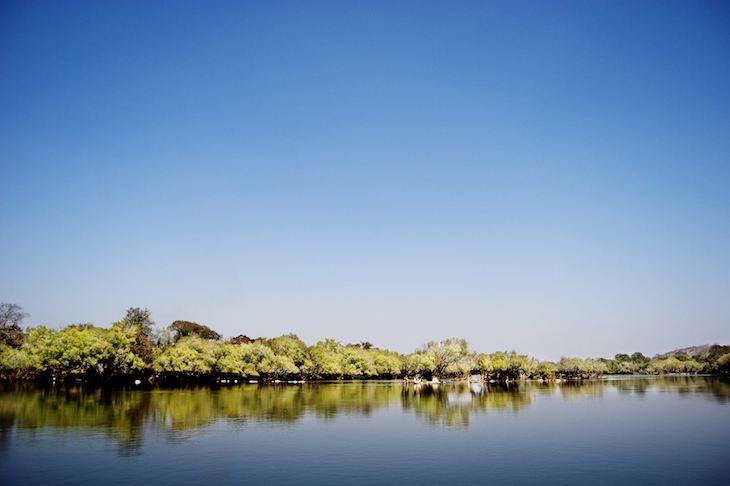The family ranch, which my father acquired when I was about six years of age, lay along the banks of the Kafue river in northern Rhodesia. Immediately above the river it was swampland. Then it rose up into ranching country where there were good, thick strands of what was then known as Rhodesian grass — a sweet, sweet grass, very nutritious to cattle and to any feeding stock. My father built a lovely old Rhodesian-style house with a thatched roof, adobe walls, and whitewashed verandas. I would come home from boarding school in July and August, which was winter and the best time to be in the African bush: not too hot and not too rainy. I was expected during that holiday period to work for five days on the ranch, doing anything my father decided I had to do. I spent a lot of time in the bush there and it was a good time to study birds, do a little bit of hunting on the side and watch our African neighbours cutting the wood. At the weekend I was allowed to take one of the Jeeps, my sleeping net and bag, and go off on my own, wherever the fancy took me. My life has carried on like that ever since — although my computer is now my Jeep and my stories the African bush which I roam.
I knew that apartheid was such an iniquitous doctrine that it couldn’t persist, but I wasn’t able to stand up and say so in public. I already had the Bureau of State Security (Boss) watching me constantly. I had a tap on my phone for years. Once I was walking down Muizenberg Beach in Cape Town, some time after apartheid ended, and a chap came up to me. ‘I know you,’ he said in an Afrikaans accent. ‘Have we met?’ I asked. ‘Ach, no, we haven’t met,’ he said, ‘but I worked for Boss and for a year I had to sit and listen to you on the telephone. Old Wilbur, you boring!’ I said to him: ‘Well whatever you do, please don’t tell my readers.’
I had a fan in the highest office of the land: former president F.W. de Klerk, the man who eventually freed Nelson Mandela, unbanned the ANC and set South Africa on the path to democracy. I first met him in 1995, after he had stepped down as deputy president in the new government of national unity, and we chatted for some time. He took me to task for my novel Rage and my portrayal of Manfred De La Rey, whom he recognised as being inspired by B.J. Vorster, the prime minister interned during the second world war for his membership of the Ossewabrandwag, the right-wing pro-Nazi militia. Many years later, when I met F.W. again at Alfred Mosimann’s private dining club in London, I greeted him heartily. ‘Hello, F.W.!’ I exclaimed, and he looked up and said: ‘Hello, old Wilbur, it’s good to see you again.’ I was flattered that he’d remembered me.
In 1991, the South African novelist Nadine Gordimer won the Nobel Prize for Literature. I was involved in the periphery of the award after a fan, Andrew Kenny, wrote to a Johannesburg newspaper, the Star, asking why I hadn’t been considered by the Swedish committee. I had never met Kenny before, but his opinion seemed to strike a chord with a great many readers, and soon letters to the editor flooded in, reflecting both sides of the debate. Kenny’s argument was that, compared with the number of people who read Nobel laureates like Gordimer, my novels — and others like them — had an immense reach, one that could influence many more people and contribute to their understanding of the modern world. Far from being pure escapist fun, Kenny argued, books like mine were the only ones that could hope to affect the way we lived our lives. Like many critics before, Kenny didn’t hold back on what he thought were my shortcomings — my books, he said, were unsubtle, my dialogue stilted, my people caricatures; my stories were filled with unbelievable sex and far-too-believable violence. Yet if he had to choose one book to explain South African politics to a foreigner, he would unhesitatingly choose Rage.
William Shakespeare was a popular writer in his day. Perhaps he would be surprised to know about the lasting place he has in English literature. His audiences at the Globe were made up of the working masses; this was a place that Londoners could come to laugh at the ribald Falstaff, and not necessarily gape in awe at the beauty and imagery of the language. Shakespeare’s crowds wanted to see the story at the beating heart of the play. Centuries later, the same was true of Charles Dickens, one of the greatest storytellers in the English language. As Andrew Kenny had said, it is the popular author who has the chance to really touch hearts and minds.






Comments